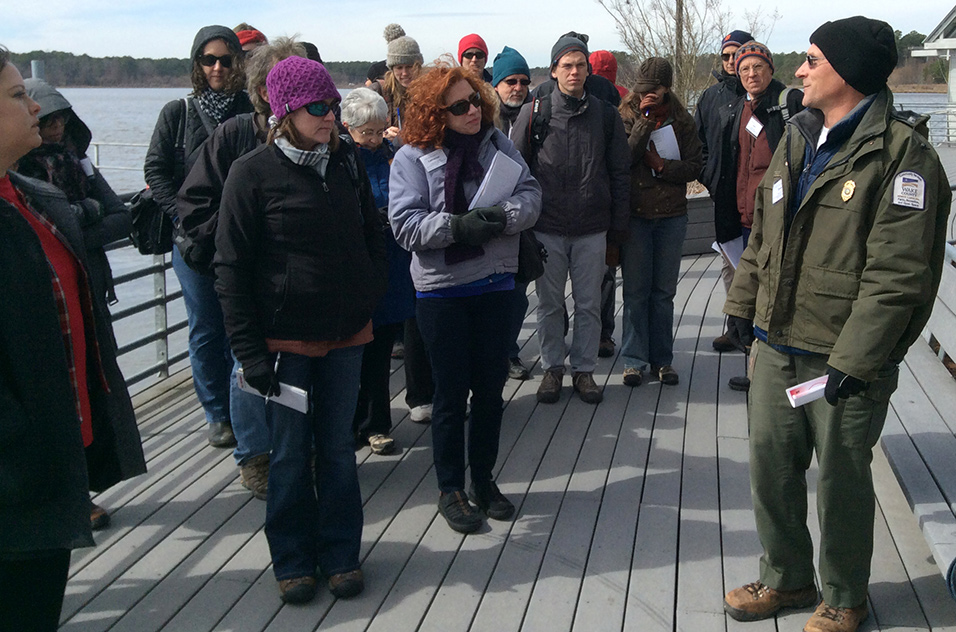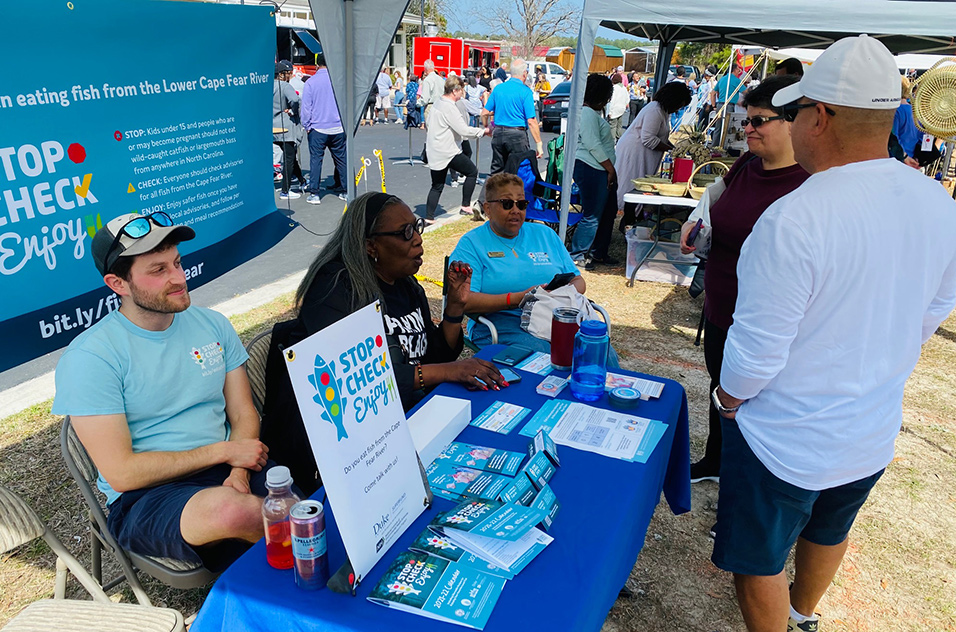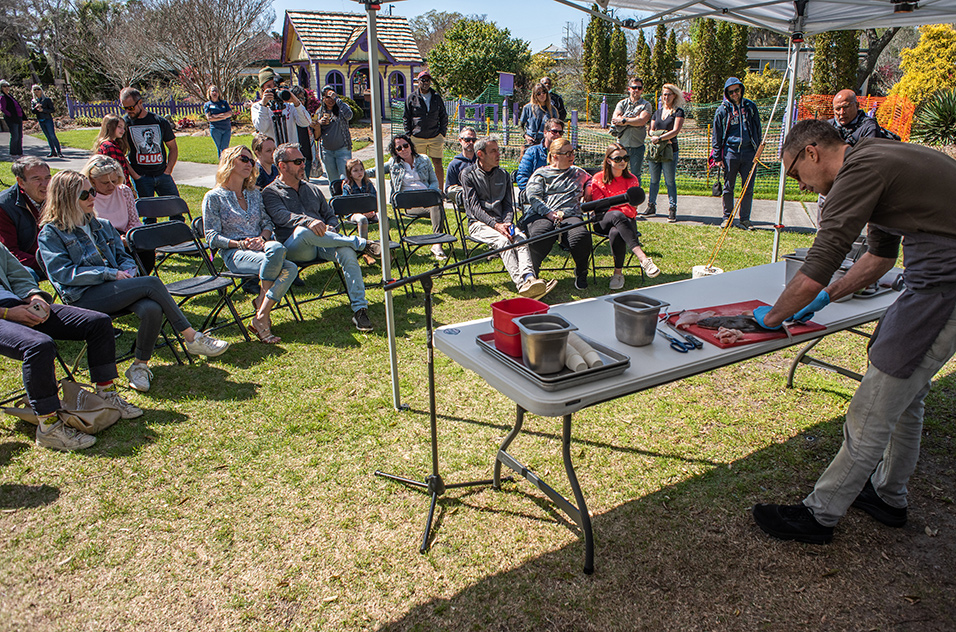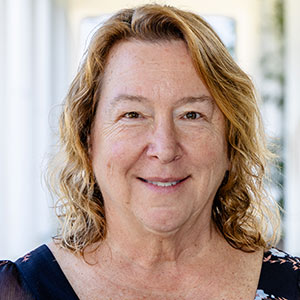Researchers across three NIEHS-funded universities and their stakeholders organized the North Carolina Fish Forum in 2019 to understand the process of setting fish consumption advisories and barriers to more effectively communicating them. Three years later, the collaborators continue to reveal new insight into contaminants in fish, inform more health-protective advisories, and communicate risks to diverse groups.
Fishing is a beloved pastime and, for many, a source of affordable, local food. However, some types of fish may contain potentially harmful contaminants. Fish consumption advisories help people understand what fish are safe to eat, for whom, and in what quantities.
Tools to reduce exposure, risk
Organized by researchers and staff from the University of North Carolina at Chapel Hill (UNC), Duke University, and North Carolina State University (NCSU) who are supported by the NIEHS Superfund Research Program (SRP), the forum brought together people from communities across North Carolina, nonprofits, and local health departments. The forum’s goals were to better understand the process of setting and communicating fish consumption advisories (and how people perceive advisories), identify areas for improvement, and foster collaboration.
 At the start of the project, in early 2019, the Fish Forum worked with a visual note-taker, Mike Schlegel, who helped capture a visual summary of the key points and discussion. Pictured from left to right: Katy May, NCSU; Elizabeth Shapiro-Garza, Duke; Megan Lane, UNC; Schlegel; Bryan Luukinen, Duke; Kathleen Gray, UNC; Catherine Kastleman, Duke; and Sam Cohen, Duke. (Photo courtesy of the Duke SRP Center)
At the start of the project, in early 2019, the Fish Forum worked with a visual note-taker, Mike Schlegel, who helped capture a visual summary of the key points and discussion. Pictured from left to right: Katy May, NCSU; Elizabeth Shapiro-Garza, Duke; Megan Lane, UNC; Schlegel; Bryan Luukinen, Duke; Kathleen Gray, UNC; Catherine Kastleman, Duke; and Sam Cohen, Duke. (Photo courtesy of the Duke SRP Center)The resulting white paper highlighted key challenges identified during the forum, including limited awareness of advisories and lack of collaboration among agencies. The team outlined next steps and opportunities to improve the effectiveness of advisories, such as creating toolkits to communicate risk to diverse populations.
“Together with our Fish Forum collaborators, we’re putting research into action to reduce exposure to harmful contaminants in fish,” said Kathleen Gray, Ph.D., who leads the Community Engagement Cores (CECs) at the UNC SRP Center and NIEHS-funded Center for Environmental Health and Susceptibility.
 Megan Lane, left, a research translation associate at the UNC SRP Center, shares ideas from a small group discussion with the larger North Carolina Fish Forum group and stakeholders, including SRP Health Scientist Administrator Heather Henry, Ph.D., middle. (Photo courtesy of the UNC SRP Center)
Megan Lane, left, a research translation associate at the UNC SRP Center, shares ideas from a small group discussion with the larger North Carolina Fish Forum group and stakeholders, including SRP Health Scientist Administrator Heather Henry, Ph.D., middle. (Photo courtesy of the UNC SRP Center)“The findings from the Fish Forum have not only informed where we have focused our attention, including on conducting additional testing in the Lower Cape Fear River area, but it also led to further collaborations with UNC and NCSU focused on supporting local health departments and nonprofits more effectively,” said Elizabeth Shapiro-Garza, Ph.D.(https://tools.niehs.nih.gov/srp/people/details.cfm?Person_ID=40924), who leads the CEC at the Duke University SRP Center(https://tools.niehs.nih.gov/srp/programs/Program_detail.cfm?Project_ID=P42ES010356).
Stop, check, enjoy!
To increase awareness about fish advisories, the Duke SRP Center team collaborated with community partners to launch the Stop, Check, Enjoy! educational campaign, tailored for subsistence fishers on the Cape Fear River. The campaign includes a video series, a customizable social media tool kit, and other outreach materials in English and Spanish about safely catching and preparing fish.
 UNC SRP graduate students share information about local fish consumption advisories with fishers at Lake Crabtree County Park. (Photo courtesy of the UNC SRP Center)
UNC SRP graduate students share information about local fish consumption advisories with fishers at Lake Crabtree County Park. (Photo courtesy of the UNC SRP Center)The team hosted several outreach events for communities in the area, like the Go Fish Fest, which educated more than 300 attendees about safe fish consumption through games, educational booths, talks by community leaders, and cooking demonstrations from local chefs.
 Attendees of the Go Fish Fest walked home with materials, including a calendar with recipes for fish that are lower in mercury in the seasons when they are most often caught, and a wallet card with valuable information about catching and eating fish from the Cape Fear River. (Photo courtesy of Alan Cradick)
Attendees of the Go Fish Fest walked home with materials, including a calendar with recipes for fish that are lower in mercury in the seasons when they are most often caught, and a wallet card with valuable information about catching and eating fish from the Cape Fear River. (Photo courtesy of Alan Cradick)Improving fish advisories
Recent research by the Duke SRP Center on the Cape Fear River found elevated levels of metals in fish samples. These findings informed a state regulator’s decision to update consumption advisories for several species and locations along the river.
The researchers are now developing a resource on collecting fish samples, working with agencies to consider data for risk assessments, and incorporating data in fish consumption advisories.
 Veronica Carter (left) and Dean Neff (right) at the Go Fish Fest. Carter, a board member of the North Carolina Coastal Federation, and Neff, a chef in Wilmington, North Carolina, work closely with Duke SRP Center researchers to develop effective communication strategies about safe fish consumption. (Photo courtesy of Alan Cradick)
Veronica Carter (left) and Dean Neff (right) at the Go Fish Fest. Carter, a board member of the North Carolina Coastal Federation, and Neff, a chef in Wilmington, North Carolina, work closely with Duke SRP Center researchers to develop effective communication strategies about safe fish consumption. (Photo courtesy of Alan Cradick)“The Fish Forum helped us understand that agencies, community organizations, and academics are all collecting fish tissue samples,” explained Katy May(https://tools.niehs.nih.gov/srp/people/details.cfm?Person_ID=46859), who leads the CEC at the NCSU SRP Center(https://tools.niehs.nih.gov/srp/programs/Program_detail.cfm?Project_ID=P42ES031009) and at the NIEHS-funded Center for Human Health and the Environment. “If these groups collect samples in a way that health departments can use for analysis, they can help inform new advisories.”
The team is also working with health departments throughout the state to develop more effective and broader communication strategies for getting the word out about potential health risks from eating wild-caught fish.
“Agencies tasked with communicating about fish advisories are often limited in resources,” said Duke SRP CEC coordinator Chiara Klein. “With NCSU in the lead, we are creating a manual to help local health departments confidently communicate about these risks, especially for affected populations.”
(Mali Velasco is a research and communication specialist for MDB Inc., a contractor for the NIEHS Superfund Research Program.)












